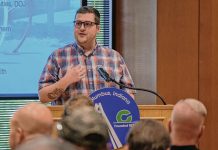The refrain is painfully too familiar today to one peacemaker committed to some sense of unity.
So the Rev. Shanta Premawardhana cringes when he sees or hears a perspective of exclusivity that says, “My belief is right. And yours is wrong.”
Bringing together people at polar opposite ends of an issue into a spirit of reconciliation is the specialty and the mission of the 64-year-old, Chicago-based Christian seminaries leader. He will aim to do precisely that when he opens the local 2016 Reconciliation Day observance from 6:30 to 8 p.m. Tuesday at Donner Center, 739 22nd St. in Columbus.
“What we try to do, for example, is bring the issue of religion to its roots,” Premawardhana said, speaking by phone while traveling in New York. “We have to realize that, when it comes to Christianity, the values of Jesus were very different than the values that many Christians espouse today.”
[sc:text-divider text-divider-title=”Story continues below gallery” ]
He last spoke in Columbus in 2006.
“This is not necessarily about solutions,” said Christine Lemley, among the leaders of Interfaith Forum of Columbus, which organized the event with the support of IUPUC. “This is about process and becoming more aware (of problems) to better take responsibility.
“So I think there will be consciousness raised.”
She outlined those challenges as racism, political polarity, tension between various faiths, struggles of groups such as the local LGBT population and social justice issues, obstacles created by growing poverty and related issues.
Premawardhana, an Alliance of Baptists member, is president of Seminary Consortium for Urban Pastoral Education. Previously, he served as director for interreligious dialogue and cooperation at the World Council of Churches in Geneva, Switzerland, and as associate general secretary for interfaith relations at the National Council of Churches of Christ in New York.
In his post with the national council, he became familiar with the efforts of J. Irwin Miller, Columbus native and former Cummins Engine Co. executive who helped found the organization and also served as its first lay president in the early 1960s. Among other issues, Miller openly fought racism and segregation nationally and internationally even when it might have cost Cummins business.
“What a great example of reconciliation,” Premawardhana said emphatically. “He provided large support for the civil rights movement. We still hold him in very high regard.”
The native of Sri Lanka understands pluralism enough that he earned a doctorate in phenomenology of religions, with a specialty in Hinduism and Christianity. He said people today must learn to view issues at least briefly from others’ perspective in order to build bridges of understanding.
“For me, reconciliation means the ability to listen to and hear the other person’s values and be able to suspend judgment while standing in their shoes to look at something from their perspective.”
— The Rev. Premawardhana Shanta Premawardhana, president of Seminary Consortium for Urban Pastoral Education
Premawardhana knows how challenging this can be. He and a team of people are working now in Charlotte, North Carolina, in the wake of a police shooting and killing of a black resident. They also have done the same work in places such as Nigeria, where militant Islamists have pushed to try to create an Islamic state.
“I do not want to appear unduly optimistic or unrealistic,” he said, emphasizing that he encourages people to practice listening skills in small group settings. “The best learning happens when you allow others to teach people in a small-group setting.”
He has closely followed growing national figures showing an increasing percentage of Americans affiliated with no church — and seems hardly surprised. Figures from agencies such as the Barna Group and also Pew Research bear out this trend.
“Often, people today are fed up with organized religion,” he said. “They feel alienated and disconnected from religion. Often, people think about religion now as bigoted, and relating more to the past century than in this century. And they feel it no longer makes sense anymore.
“And it seems that many of those still pursuing religion are going to extreme religions, whether that’s in the fundamentalist Christian tradition or the radical Islamic tradition. So, then a huge divide is developing.
“Sadly, we are losing the middle group, the moderate religious institutions.”
[sc:pullout-title pullout-title=”If you go” ][sc:pullout-text-begin]
Who: The Rev. Shanta Premawardhana, president of Seminary Consortium for Urban Pastoral Education, offering opening remarks at the local celebration of the 2016 Reconciliation Day. He also will guide workshop groups.
When: 6:30 to 8 p.m. Tuesday.
Where: Donner Center, 739 22nd St. in Columbus.
Admission: Free and open to everyone.
Organizers/sponsors: Interfaith Forum of Columbus and IUPUC.
Information: Interfaith Forum Facebook page.
[sc:pullout-text-end]




